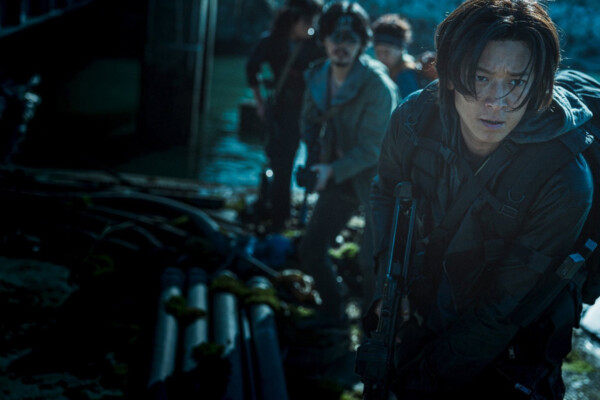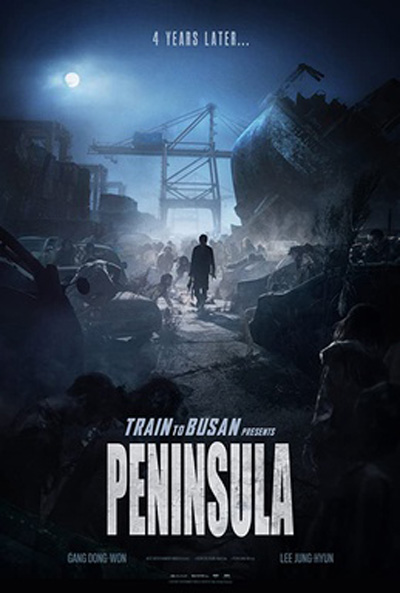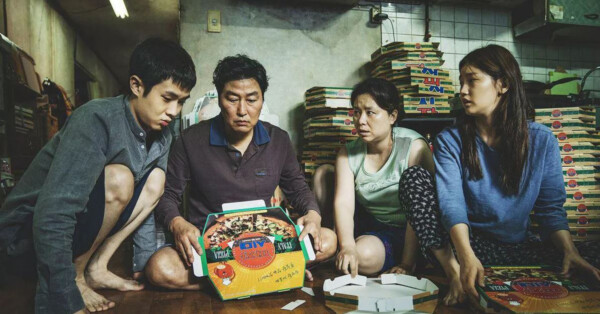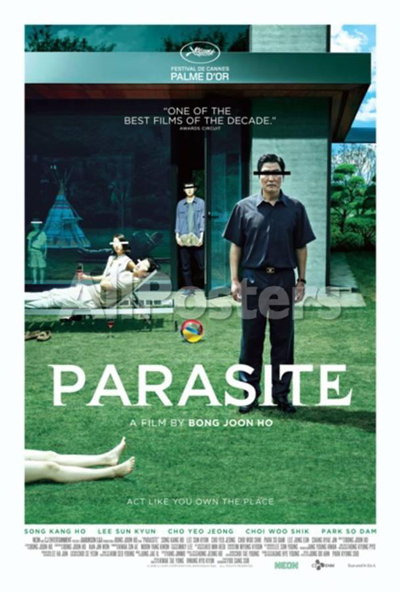Mladen and Del review ‘Train to Busan Presents: Peninsula’

Image courtesy of Next Entertainment World.
“Train to Busan Presents: Peninsula.” Starring Lee Jung-hyun, Dong-won Gang, Re Lee, Ye-won Lee, Hae-hyo Kwon, Kyo-hwan Koo, and others. Directed by Sang-ho Yeon. 115 minutes. Rated PG-13. Amazon pay-to-stream
Mladen’s take
There I sat, wavering. It was about three-fifths of the way through the South Korean movie “Train to Busan Presents: Peninsula.” My qualms included a meditation on the film’s weird title, which was clearly an example of success exploitation marketing. Was this semi-sequel to the excellent film “Train to Busan” worthy of a good grade or does it deserve a bad grade? And, then, came the straight-faced line: “Let’s get Mom.” Poof, I dropped into the “Better than Average” column, but only just.
Before I sum the plot, you’re owed a warning. Del the zombie-phile will praise this movie, maybe even slip it an A-. He’ll be wrong. The movie is one full grade lower, but worth watching. It cost me 55 cents to lease a 48-hour viewing window on Amazon.
Recall that “Train to Busan” introduced us to some very good action horror with an unremarkable plot very well executed. A bioengineering laboratory accidentally releases a contagion that transforms people into something akin to the rampaging quasi-dead hungry we first met in 2010’s “28 Hours Later.” In “T to B,” the story was driven by a father trying to keep his daughter alive, if I recall accurately, as the infected multiply and the state rapidly loses control of law and order. “T to B” possessed stunning special effects. The locomotive slowly motoring along while zombies clinging to the back of the machine pile on each other to make a squirming, yet flowing tail of organic debris was something else.
That “something else” was missing in “Peninsula.” The computer-generated special effects lacked believable physics of motion. The vehicles bulldozing through zombies, jumping roads, or smashing into each other seemed like Matchbox cars running the gauntlet of a plastic race course. Also, at times, “Peninsula” seemed very “Casshern”-like or “Alita: Battle Angel”-ish. The difference is that “Casshern,” a 2004 Japanese movie, and “Alita” of 2019 intentionally deployed the tinge of anime as part of the storytelling. “Peninsula,” which imagined quarantined South Korea four years after the “T to B” virus was unleashed, often portrayed dilapidated urban terrain or action scenes with the patina of a video game that had mated with anime to create an almost-cartoon. In short, the visual effects in “Peninsula” were surprisingly crappy.
Oh, the plot. A South Korean soldier loses his sister and nephew to zombie-itis, but manages to save his brother-in-law. A few years later, the pair gets sucked into returning to South Korea to retrieve a truck load of American dollars for an American gangster based in Hong Kong. If they and a couple of others succeed, they get half of $20 mil. That’s money that would get them out of the political limbo of being microbe-induced refugees. Naturally, the return to the Peninsula, get it, goes astray. Dong-won Gang, playing South Korea Army Capt. Jung Seok, gets pulled off a zombie dinner plate by feisty, hard-driving teenager Jooni, played by Re Lee, and her younger sister Ye-won Lee as Yu Jin. They flee to their hideout, where Jung meets resourceful, determined, and very pretty Min Jung. Min is played by Lee Jung-hyun. She’s the mom in “Let’s get Mom.” While Jung, Min, and the girls are good and likeable characters in the film, most of the bad guys are all pretty much clichés and fail to be unlikeable. The exception was Captain Seo, nicely portrayed by Kyo-hwan Koo as desperate and scheming to the end. He has no trouble shooting the old man and Mom to get the hell off the Peninsula.
The soundtrack in the film is good enough. There was a moment when I thought I heard a few stanzas, verses, whatever you call pieces of music, that sounded like an adventure tune in the video game “Halo.”
OK, Del, take it away with your take. Please don’t let the blubbery family scenes in “Peninsula” color your judgment as they did when you watched the last film we reviewed. We owe it to our growing readership to assess correctly the merits of a film.

Del’s take
It was I who recommended to Mladen that we review “Peninsula.” It was not I who recommended that he tap the cooking sherry before writing his review.
He’s correct when he describes the putative prequel to “Peninsula,” “Train to Busan” as excellent. I remember foraging through Netflix one night, searching for something to watch, when I stumbled across “T to B.” Another hokey foreign zombie flick, I warned myself, before clicking the “play” button. Imagine my surprise when I discovered a modern classic in science fiction-horror, one I’ve added to my DVD collection. “T to B” is that good. I would rate it up there with the Zack Snyder remake of “Dawn of the Dead.”
So it was with great expectations that I forked over my 99 cents to watch “Peninsula.” (I’d like to know how Mladen managed to do that for 55 cents. Did he get the cooking sherry discount?)
To put it succinctly, I was not impressed. For these reasons:
1. It’s derivative. Take the premise of “28 Weeks Later,” throw in some “Escape from New York” and using crude, Frankensteined stitches graft on any road chase sequence from the “Mad Max” movies and you’ve got “Peninsula.”
2. Mladen was right about another aspect of the film – the special effects. They weren’t just bad. They were cartoonish, on par with “Speed Racer.” They completely ruined the movie for me because I’ve seen car chases and motorized mayhem done right – all that metal-crunching comprises a story of its own. You want a car chase? Consult George Miller. You don’t hand it to the CGI folks, and that’s what the creators did with “Peninsula.” Those scenes screamed “Fake!” and threw me out of the zombie-infested universe Sang-ho Yeon sought to create.
3. Many of the major characters were unlikable. As Mladen explained, the point of this group’s return to zombie-infested South Korea is to recover a truckload of American dollars. The deal is a small group will find the truck and drive it back to an Inchon dock, where it will be loaded aboard a ferry. The group gets half the $20 million and the crooks get the other half. Ahem. Of course. The crooks will most definitely abide by their end of the deal. Have you never heard of honor among thieves?
The movie is really about Gang Dong-won’s character attempting to redeem himself after refusing to help a family in need during the initial, hyper-frantic days of the zombie outbreak. As subtexts go it’s about as subtle as a Mar-a-Lago powder room and Jung-seok is such a weak and altruistic tormented-soul type that by mid-movie you’re hoping one of his putrid antagonists makes a snack of him.
4. Nitpicks. Why does a director spend a considerable chunk of screen time building tension and setting a deadline, and when that deadline arrives the director allows his characters to engage in long, deadline-busting soliloquies and dénouements?
How is it that a car will start after sitting idle four years?
Why are children always precocious and infallible?
Why are the elderly characters always expendable?
Why does a highway choked with wrecked and abandoned vehicles always have a lane open?
Why was South Korea simply abandoned? Is its net worth beneath the scope of recovery?
5. The version I saw was not subtitled. It was dubbed. Have I ever told you how much I hate dubbing? When you can see the character’s mouth moving while the dialogue track stopped three seconds ago?
Enough fussing. Bottom line: I was hoping for a movie that matched the off-the-rail entertainment punch of “Train to Busan” and what I got for my 99 cents (Really, Mladen? Fifty-five cents?) was something altogether different and, dare I say, less everything. I could wax all movie-review poetic and talk about the film’s emotional core or its resonance to the genre template but this is not a thirst trap for pretty words. Suffice it to say “Peninsula” was a disappointment.
For much better fare about the undead try “Cargo” or the unbelievably good series “Black Summer,” both on Netflix at no extra charge. For an even weirder take on the zombie genre try Arnold Schwarzenegger in “Maggie,” which you can find in some DVD bargain bins.
“Peninsula” gets a grade of C from me.
Mladen Rudman is a former journalist and technical writer. Del Stone Jr. is a former journalist and author.

Image courtesy of CJ Entertainment.
“Parasite” Starring Song Kang-ho, Jang Hye-jin, Choi Woo-shik, Park So-dam, Cho Yeo-jeong, Lee Sun-gyun and others. Directed by Bong Joon-ho. 2 hours, 12 minutes. Rated R. Hulu, Amazon Prime.
Del’s take
Maybe it’s a sign of the times that for two years running a movie about class structure has won the Academy Award for Best Picture, or maybe it’s just a reward for classy moviemaking. No matter. “Parasite,” the 2019 Best Picture winner, earns that accolade and then some with its darkly hilarious and stingingly critical look at the way money makes monsters of us all.
In the past, South Korean director Bong Joon-ho used fantasy elements to illustrate the dehumanizing aspects of Western – and now Eastern – culture and its fixation on accumulating wealth at the expense of the planet and its people, but in “Parasite” he brings the argument closer to home with ordinary folks, in this case the Kim family, jumping through extraordinary hoops to escape their poverty and maybe even climb the lower rungs of the ladder to success.
The Kims – father Ki-Taek, mother Chung-sook, sister Ki-jung and brother Ki-Woo – are living in a semi-subterranean roach trap where they fold pizza boxes to earn a living, open their windows when the fumigator comes down their alleyway, and wile away the hours dreaming up scams so they may, in the words of the “Good Times” TV show theme song, begin “movin’ on up to the big time.” An opportunity finally comes their way when Brother Ki-Woo connects with a friend who recommends him for a private teaching job. The wealthy Park family needs a new tutor for their teenaged daughter, and before the movie has finished they will also need a new driver, housekeeper and art therapy teacher for their son – all provided by the Kim family after a bit of slyly funny subterfuge, disinformation and Machiavellian maneuvering.
But karma catches up with the Kims and their machinations pile up like logs stuck in a flume. At that point “Parasite” takes a left turn from a “I Love Lucy”-style farce about a family of ne’er-do-wells creating their own misfortune to a razor-sharp satire about the inequalities of class and how those inequalities can drive some people to madness.
“Parasite” is perfectly acted and written, and I would rate it one of the finest black humor stories ever set to film – up there with “Dr. Strangelove” and “Being There.” It delivers many of its lessons through dialogue. In one scene, the wealthy Parks are having what they think is a private conversation about Mr. Kim and his odor – he smells like old radishes, or the people who ride the subway, Mr. Park muses, to which Mrs. Park replies that she hasn’t ridden the subway in ages. In another scene young Ki-Woo is asking his father if he has a plan for dealing with their latest predicament and the elder Kim replies that indeed he does have a plan, and it is the best plan of all, which is to have no plan because plans fail and leave the planner disappointed and fearful.
As the movie progresses along the trajectory of its increasingly bizarre resolution it becomes impossible not to watch and remains with the viewer long after the closing credits roll. Suffice it to say the Kims might yet climb out of their below-ground-level living conditions but not in the way they planned. Remember: The best plan is to not have a plan.
It took me the first third of the movie to become invested in “Parasite” but once I did I became a huge fan. I think it’s one of the best movies made this century and I will add it to my DVD collection. It’s on Hulu for subscribers, or you can watch it pay-per-view on Amazon Prime.
I give it an A+.

Mladen’s take
Del gives “Parasite” an A+. I give it an A-. The bout of graphic violence at the end distracts the movie. It’s not that the violence is unwarranted. It’s that it should’ve been done with more finesse and less blood.
Del, who’s ordinarily good at summing a movie, misfired on this one. “Parasite” is about both class warfare in the traditional sense – the wealthy pissing on the poor – and interclass warfare between the considerably less well off. To me, that was the movie’s strongest component and lead to its funniest, most satirical scene.
The Kim’s infiltrate the wealthy Park family by shitting on others who are poor or one lost job from tumbling into poordom. One of the Kim shat-upons is the Park’s housekeeper. The Kims connive a way to get her fired so that Mama Kim can take over as the maid. One event leads to another and pretty soon the fired housekeeper and her husband are threatening to expose the Kim con on social media by pressing the “send” button on a cell phone. The kerfuffle that comes along is a hoot. The Kims and the housekeeper (six people) fight up bomb shelter stairs and in a sprawling living room with cell phone imagery and its distribution on the World Wide Web as the prize.
“Parasite” is director Bong Joon-ho at nearly his finest. I’ve watched four of his films. “Snowpiercer” is superb. “Parasite,” along with “The Host” and “Okja” are merely excellent. But they all share a backbone: Mankind is deranged.
Obviously, Bong isn’t the only filmmaker to tackle social injustice. From 1927’s “Metropolis” to 2020’s “Nomadland” the ugliness of our species is well notated. The important part about the message in “Parasite” is that it shows snobbery, greed, selfishness, and disillusionment are the globe’s real currencies. South Korea’s won, the euro, America’s dollar, Brazil’s real, and whatever the fuck Bitcoin is, are just tools that magnify humanity’s flawed, odious character.
I watched “Parasite” with some pleasure. It reinforced what I’ve long known and witnessed almost daily as a newspaper reporter. We the people know what’s going wrong with society. We know what it would take to correct the errors of homelessness, hunger, and medical care rationing based on access to wealth. But we ain’t gonna do nothing about them.
I don’t know. Maybe it’s time that I stop watching films with dire portent or those that feature potent dissection of social ills. Maybe it’s time that I re-watch “E.T. The Extraterrestrial,” “The Princess Bride,” and “The NeverEnding Story” and then stop watching movies all together because they seem to be ever more disturbingly prophetic.
Mladen Rudman is a former journalist and technical writer. Del Stone Jr. is a former journalist and author.